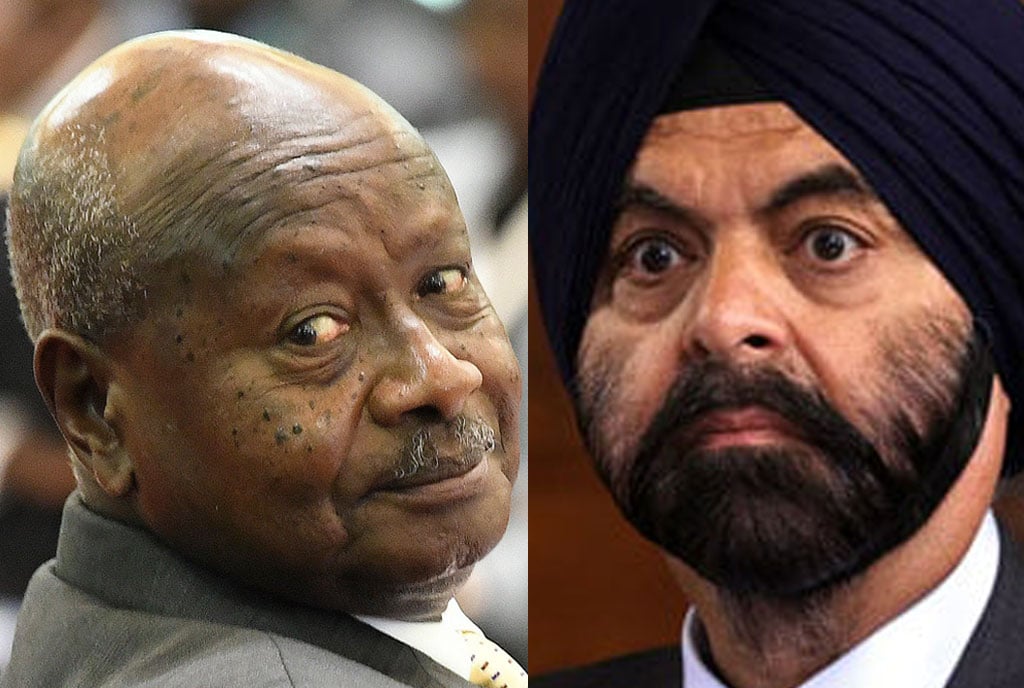Prime
Why defiant Uganda still needs World Bank money

Uganda's President Museveni and World Bank President Ajay Banga. PHOTO/FILE
What you need to know:
- Uganda is a donor-dependent country. It is a weak sub-Saharan economy, one that last had a balance of payments surplus in 1980, with few State institutions that work.
The World Bank mid this week threw a bombshell of an announcement at Uganda.
Not entirely unexpected, in light of Uganda’s recent anti-homosexuality law, the World Bank, one of the world’s most important financial and economic development institutions, stated that Uganda’s new law proscribing homosexuality made it morally and, most importantly, legally impossible for the bank to finance any further programmes in Uganda.
Read the statement, issued on August 8: “Uganda’s Anti-Homosexuality Act fundamentally contradicts the World Bank Group’s values. We believe our vision to eradicate poverty on a livable planet can only succeed if it includes everyone irrespective of race, gender, or sexuality. This law undermines those efforts. Inclusion and non-discrimination sit at the heart of our work around the world.”
“Immediately after the law was enacted, the World Bank deployed a team to Uganda to review our portfolio in the context of the new legislation. That review determined additional measures are necessary to ensure projects are implemented in alignment with our environmental and social standards.
“Our goal is to protect sexual and gender minorities from discrimination and exclusion in the projects we finance. These measures are currently under discussion with the authorities,” the bank said.
“No new public financing to Uganda will be presented to our Board of Executive Directors until the efficacy of the additional measures has been tested. Third-party monitoring and grievance redress mechanisms will significantly increase, allowing us to take corrective action as necessary.
“The World Bank Group has a longstanding and productive relationship with Uganda; and we remain committed to helping all Ugandans—without exception—escape poverty, access vital services, and improve their lives.”
There was an equally predictable reaction from Ugandans, from conservative Christians and Muslims denouncing the World Bank and insisting the moral thing had to be upheld, to Uganda government spokespersons and ministers defiantly dismissing the bank’s neo-colonial manipulativeness, various Opposition activists bitterly wondering where the bank and other Western institutions are whenever the Ugandan security services brutalise them, and why they only respond when it is the tiny minority of Ugandan gays, and more along those lines.
From a technical and procedural point of view, it made rational sense for the World Bank to act as it has decided.
A Kampala lawyer, Silver Kayondo, succinctly put the development into perspective in a post on Twitter on August 10.
Lightly edited here, he wrote:
1) Lenders are free to dictate their lending terms.
2) Sovereigns/ [Government] have the right to protect their sovereignty.
3) Borrowers are not tied to specific lenders.
4) Lenders push values of their shareholders.
5) Economic size and political significance shape treatment.
Kayondo’s points one to four are all logical and reasonably factual, both from the point of view of the World Bank and that of the Uganda government and general public.
But of course, all four points lead to an unavoidable crisis for Uganda, as Kayondo observes in the fifth point about economic size.
President Museveni, via his Twitter account, was quoted as dismissively saying, “Uganda will develop with or without loans.”
However, on Thursday, August 10, the minister of State for Finance, Henry Musasizi, informed Parliament that the Uganda government intends to revise the national budget, following the World Bank’s announcement.
Payments to civil servants and other government officials could be affected, Musasizi added.
This is where we get to the heart of the matter, and the old proverb about beggars not being choosers.
Uganda is a donor-dependent country. It is a weak sub-Saharan economy, shaky at best, one that last had a balance of payments surplus in 1980, with few State institutions that work, and like most African countries had to rely on the West and/or China to provide it with Covid-19 vaccines.
The US embassy in Kampala a few years ago published a report on where United States aid and support to Uganda goes. That report read like a foreign government doing almost all the heavy lifting for Uganda and left a few readers wondering exactly what the NRM government really does on its own.
Like most economies, Uganda has not yet fully recovered from the two-year Covid-19 economic lockdown.
China last week reported the biggest drop in its exports since the start of the Covid-19 lockdown in February 2020 and also a very large drop, about 19 percent, in its imports.
This is because of slowing consumer demand in Europe, North America, and most of Asia, affecting China along the way.
This then means Uganda will face a similar reduction in its exports.
In other words, this is not the best time to suddenly lose funding from the World Bank, whatever pan-Africanists feel about its “neo-colonial” policies.
African countries that dismissed the West and declared that they would turn to China for alternative debt and development financing, are discovering that China, if anything, is even tougher than the West in demands that its loans be repaid.
That’s why when dawn broke and Uganda government officials were done with the defiant posturing, the cold, sobering reality of just how shaky the country’s finances are and just how they are dependent on the World Bank, set in.





